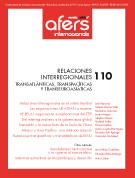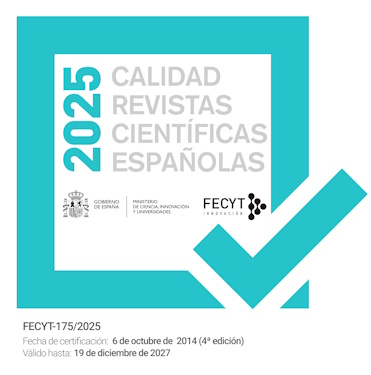Las industrias extractivas en Mozambique: ¿amenaza u oportunidad para el desarrollo?
Paraules clau:
recursos naturales, industrias extractivas, Mozambique, maldición de los recursos, cambio estructuralResum
Revista CIDOB d’Afers Internacionals, nº 110
Cuatrimestral (mayo-septiembre 2015 )
ISSN:1133-6595 | E-ISSN:2013-035X
Como consecuencia de una serie de recientes hallazgos geológicos, en pocos años Mozambique ha pasado de ser un país con escasos recursos naturales a ser potencialmente uno de los grandes productores y exportadores mundiales de carbón y gas. Ello está atrayendo a numerosas empresas transnacionales del sector extractivo dispuestas a explotar estos recursos. En este contexto, nos preguntamos qué efectos sobre el desarrollo puede tener el establecimiento y expansión de estas industrias en el país. Para responder a esta cuestión, usamos varios marcos teóricos, como las teorías de la maldición de los recursos y las teorías del cambio estructural. La conclusión es que, a pesar de las potenciales amenazas para el desarrollo que suponen, las industrias extractivas también podrían contribuir al cambio estructural y al desarrollo en Mozambique bajo determinadas condiciones, externas e internas, que en buena medida no se dan en la actualidad.
Referències
ACET. African Transformation Report. Growth with Depth. Accra: African Center for Economic Transformation, 2014.
ActionAid. Real Aid. Ending Aid Dependency. Londres: ActionAid, 2011.
AFP. Mozambique mulls sovereign wealth fund. Agence France Presse, 30 de mayo de 2014.
AllAfrica. Mozambique: Record Coal Production in Moatize, 16 de julio de 2013 (en línea) [Fecha de consulta 09.03.2015] http://allafrica.com/stories/201307181259.html
Auty, Richard M. Sustaining Development in Mineral Economies: The Resource Curse Thesis. Londres: Routledge. 1993
Brunnschweiler, Christa N. y Bulte, Erwin. «The resource curse revisited and revised: A tale of paradoxes and red herrings». Journal of Environmental Economics and Management, n.º 55 (2008), p. 248-264.
Castel-Branco, Carlos Nuno. «Reflectindo sobre a acumulação, porosidade e industrialização em contexto de economia extractiva», en: De Brito L. et al. (eds.) Desafios para Moçambique 2013. Maputo: IESE, 2013.
Castel-Branco, Carlos Nuno y Mandlate, Oksane. «Da Economia Extractiva à Diversificação da Base Produtiva: O Que Pode o PARP Utilizar da Análise do Mode de Acumulação em Moçambique?», en: De Brito, Luís; Castel-Branco, Carlos Nuno; Chichava, Sérgio y Francisco, António (eds.). Desafios para Moçambique 2012. Maputo: IESE, 2012.
Chambal, Hélder. «Energy security in Mozambique. Series on Trade and Energy Security». Policy Report, n.º 3. IISD (International Institute for Sustainable Development), 2010.
Chazan, Guy. «ENI and Anadarko join forces in Mozambique». Financial Times (21 de diciembre de 2012).
Coalguru. Vale coal production overview update for 2014 (en línea) [Fecha de consulta 09.03.2015] http://coal.steelguru.com.
Colom-Jaén, Artur. «Recursos Naturales y Desarrollo en el Chad: ¿Maldición de los recursos o inserción periférica?». Revista de Economía Mundial, n.º 31 (2012), p. 77-109.
Colom-Jaén, Artur y Bidaurratzaga-Aurre, Eduardo. «The Resource Curse Debate after Mozambique’s Emergence as an Energy Exporter», en: Scholvin, Sören (ed.). A New Scramble for Africa? The Rush for Energy Resources in SubSaharan Africa. Surrey (UK): Ashgate, 2015.
Colom-Jaén, Artur y Campos-Serrano, Alicia «Oil in Chad and Equatorial Guinea: widening the focus of the resource curse». European Journal of Development Research, vol. 25, n.º 4 (2013), p. 584-599.
Corden, W. Max y Neary J. Peter. «Booming Sector and De-Industrialisation in a Small Open Economy». The Economic Journal, vol. 92, n.º 368 (1982), p. 825-848.
ESI-Africa. Towards realisation of Ncondezi power project in Mozambique, 2013 (en línea) [Fecha de consulta 09.03.2015] http://www.esi-africa.com/towards-realisation-of-ncondezi-power-project-in-mozambique
Gqada, Ichumile. «A Boom for Whom? Mozambique´s Natural Gas and the New Development Opportunity». African Perspectives. Global Insights. Occasional Paper, n.º 151 (2013). Governance of African Resources Programme. SAIIA (South African Institute of International Affairs).
Hirschmann, Albert Otto. The Strategy of Economic Development. New Haven y Londres: Yale University Press, 1958.
HRW. «What is a house without food?». Mozambique’s Coal Mining Boom and Resettlements. Washington: Human Rights Watch, 2013.
IEA. Medium-Term Coal Market Report 2013. Market Trends and Projections 2018. International Energy Agency, 2013 (en línea) [Fecha de consulta 09.03.2015] https://www.iea.org/publications/freepublications/publication/MTcoalMR2013_free.pdf
IMF. «Investment Objectives of Sovereign Wealth Funds. A Shifting Paradigm». IMF Working Papers, n.º 11/19. Washington: IMF, 2011.
IRIN. «Unwelcome effects of mining in Mozambique». IRIN News. Humanitarian News and Analysis (11 de abril de 2013) (en línea) http://www.irinnews.org/report/97822/unwelcome-side-effects-of-mining-in-mozambique
Justiça Ambiental. Whose development is it? Investigating the Mozal aluminium smelter in Mozambique, 2012 (en línea) [Fecha de consulta 09.03.2015]. www.jubileedebtcampaign.org.uk/download.php?id=1107
Karl, Terry Lynn. The Paradox of Plenty: Oil Booms and Petro-States. Berkeley: University of California Press, 1997.
Kuegler, Alice. Fiscal Treatment of Mega-Projects. In Taxation in Mozambique. Londres: Routledge, 2009.
Lopes, José. Corredores Mineiro-Energéticos 2020. Impactos Marítimos do Afro-Índico no Canal de Moçambique. Maputo: CESAB (Centro de Estudos Sociais Aquino de Bragança), 2013.
Mining Review. «Eurasian Natural Resources Corporation presents coal terminal in Mozambique» (7 de septiembre de 2012) (en línea) [Fecha de consulta 09.03.2015] http://www.miningreview.com/eurasian-natural-resources-corporation-presents-coal-terminal-in-mozambique
Mkandawire, Thandika. «How the New Poverty Agenda Neglected Social and Employment Policies in Africa». Journal of Human Development and Capabilities, vol. 11, n.º 1 (2010), p. 37-55.
Morris, Mike; Kaplinsky, Raphael y Kaplan, David. One Thing Leads to Another. Promoting Industrialisation by Making the most of the Commodity Boom in SubSaharan Africa. University of Cape Town y The Open University, 2012.
Mosca, João y Selemane, Tomás. «Mega-projectos no meio rural, desenvolvimento do território e pobreza», en: de Brito, Luís; Castel-Branco, Carlos Nuno; Chichava, Sérgio y Francisco, António (eds.). Desafios para Moçambique 2012. Maputo: IESE, 2012.
OECD/AfDB/UNDP/ECA. African Economic Outlook 2012. Mozambique. OECD Publishing, 2012. (en línea) [Fecha de consulta 09.03.2015] http://www.africaneconomicoutlook.org
OECD/AfDB/UNDP/ECA. African Economic Outlook 2013. Mozambique. OECD Publishing, 2013. (en línea) [Fecha de consulta 09.03.2015] http://www.africaneconomicoutlook.org
OECD/AfDB/UNDP/ECA. African Economic Outlook 2014. Mozambique. OECD Publishing, 2014. (en línea) [Fecha de consulta 09.03.2015] http://www.africaneconomicoutlook.org
PwC. From Promise to Performance: Africa Oil & Gas Review. PricewaterhouseCoopers. South Africa, 2013 (en línea) [Fecha de consulta 09.03.2015] http://www.pwc.com/en_NG/ng/pdf/pwc-africa-oil-and-gas-review.pdf
Ross, Michael. «The Political Economy of the Resource Curse». World Politics, vol. 51, n.º 2 (1999), p. 297-322.
Saad-Filho, Alfredo y Weeks, John. «Curse, Disease and Other Resource Confusions». Third World Quarterly, vol. 34, n.º 1 (2013), p. 1-21. Sánchez, Ángeles et al. «Comercio internacional, materias primas y enfermedad holandesa: estudio comparativo de los efectos estáticos en Noruega y Chile». Revista de Economía Mundial, n.º 39 (2015). Universidad de Huelva (en línea) http://rabida.uhu.es/dspace/bitstream/handle/10272/10703/Comercio_internacional.pdf?sequence=2
SARW. Coal versus Communities: Exposing Poor Practices by Vale and Rio Tinto in Mozambique. Southern Africa Resource Watch, 2012.
Selemane, Tomás. «Mozambique to become one of biggest coal & gas producers». Mozambique political process bulletin, n.º 53 (2013).
SPTEC Advisory. «Mozambique. The Emergence of a Giant in Natural Gas». 2012 Country Review. SPTEC Advisory, 2013 (en línea) [Fecha de consulta 09.03.2015] www.sptec-advisory.com
UNCTAD. Economic Development in Africa Report. Structural Transformation and Sustainable Development in Africa. Ginebra: UNCTAD, 2012 (en línea) [Fecha de consulta 09.03.2015] http://unctad.org/en/PublicationsLibrary/aldcafrica2012_embargo_en.pdf
UNECA. Minerals and Africa’s Development. Addis Ababa: United Nations Economic Commission for Africa and African Union, 2011.
UNECA. Economic Report on Africa: Making the Most of Africa’s Commodities. Addis Abeba: United Nations Economic Commission for Africa and African Union, 2013.
UNICEF Mozambique. Mozambique situation analysis. Fiscal space and financing scenarios in the context of the resource boom, 2014 (en línea) [Fecha de consulta 09.03.2015] http://sitan.unicef.org.mz/english/files/UNICEF_Fiscal%20Space%20Analysis%20of%20the%20social%20sector%20over%20the%20next%2010%20years_SitAn_English_FINAL.pdf
USGS. 2010 Minerals Yearbook. Mozambique. US Geological Survey, 2010 (en línea) [Fecha de consulta 09.03.2015] http://www.usgs.gov
USGS. 2011 Minerals Yearbook. Mozambique. US Geological Survey, 2011 (en línea) [Fecha de consulta 09.03.2015] http://www.usgs.gov
USGS. 2012 Minerals Yearbook. Mozambique. US Geological Survey, 2012 (en línea) [Fecha de consulta 09.03.2015] http://www.usgs.gov
Viale, Claudia y Cruzado, Edgardo. La Distribución de la Renta de las Industrias Extractivas a los Gobiernos Subnacionales en America Latina. Revenue Watch Institute, 2012 (en línea) [Fecha de consulta 09.03.2015] http://www.resourcegovernance.org/sites/default/files/Revenuedistribution-Spanish.pdf
Whitfield, Lindsay. «How Countries Become rich and Reduce Poverty: A Review of Heterodox Explanations of Economic Development». Development Policy Review, vol. 30, n.º 3 (2012), p. 239-260.













